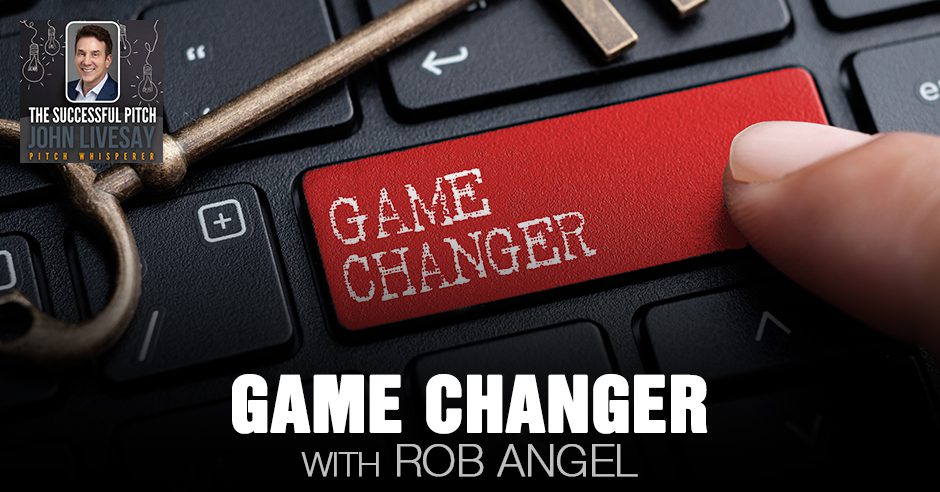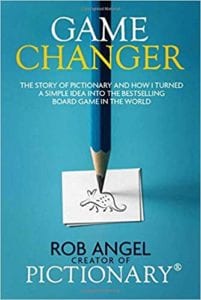Game Changer With Rob Angel
Posted by John Livesay in podcast0 comments

From a simple idea to a bestselling board game, Rob Angel is a success story. On today’s show, John Livesay chats with Rob who is the creator of the iconic board game Pictionary and the author of Game Changer. Using a few simple tools, a Webster’s paperback dictionary, a No.2 pencil, and a yellow legal pad, Rob created the phenomenally successful and iconic board game. Today, John and Rob talk about aligning with your goals and the importance of valuing your vision over money. They break down the components of Rob’s motto with the acronym OPEN (opportunities, possibilities, energy, and now) and discuss how this brings you to achieving your goals.
—
Listen to the podcast here
Game Changer With Rob Angel
Our guest is Rob Angel who happens to be a personal friend of mine as well. In 1985, Rob was a 26-year-old waiter from Seattle. Using a few simple tools of Webster’s paperback dictionary, a number two pencil, and a yellow legal pad, he created the phenomenally successful and iconic board game, Pictionary. He had no manual to turn to. He relied on his intuition, hard work, and that unwavering entrepreneurial spirit that we love so much here at The Successful Pitch to turn Pictionary into a global powerhouse. He put together the first 1,000 games by hand in his tiny apartment. He mastered all the needed business components including sales, marketing, and distribution. For the next seventeen years, he shepherded the distribution in 60 countries and 45 languages with over 38 million Pictionary games being enjoyed by people from all around the world before he sold it to Mattel in 2001. Rob has all kinds of insights to share on what he realized about resilience, persistence, and focus. Rob, welcome to the show.
Thanks for having me.
I love this story of origin. Usually, I ask my guests to start but your introduction gives us and paints that great picture of you with your dictionary, a piece of paper, and a pencil. You think, “To start a company, I need all this money and resources.” You figured out a way to do it without all that. Can you take us back to when you first had the idea? I know it wasn’t this straight linear, “I’ve got this idea. Where’s the paper?” and off you’re running. There were a few challenges in there that would be helpful for people to know about, a little procrastination perhaps or maybe some other things.
Nothing is in a straight line as you say. When I was a young man who graduated from college, I’d seen my dad as this businessman. He ran this company and I thought, “That’s what I want to be when I grow up.” I wanted to be with my dad, and he got fired. All of a sudden, my worldview of who I was and what I wanted to be was gone. I decided at that moment that I was going to work for myself. I was going to be my own boss and in charge of myself. That was the backdrop. A couple of years later, I moved in with three roommates. One of them said one night, “Do you want to play this game?” We played it in college called charades on paper. We get words out of a dictionary. I was always looking for an opportunity. At this moment, the opportunity was to have fun. I didn’t see it as a job or anything. We stayed up all night long playing this game. There’s my a-ha moment. “I’m going to turn this into a board game.” That was it. It was a simple activity. That was the genesis. It didn’t go quite so smoothly, but that’s how it all got started.
Clearly, it was your friends or other people who were playing this game. What do you think it is about you that made you think this could be an actual thing? A game that people would play and grow that other people didn’t see. They just thought, “We’re just having fun.”
[bctt tweet=”When overwhelmed, take a time out. What is an easy first step you can take? ” username=”John_Livesay”]
It was my mindset. I’ve always been looking for an opportunity. I was always looking to create. I’m always looking for something. I wasn’t sitting back and waiting. When it came, it was put out to four different guys. I latched on to it. I said, “This is in my wheelhouse. This fits what I’m looking for.”
This concept of you having the best opportunity in the world presented to you and if you don’t have the mindset of, “I’m looking for something,” versus “I’m just going to keep floating along, see what happens, and not figure out how to make my own way in the world,” is the key. Did you ever feel a little bit of what’s known as the imposter syndrome? You’re a 26-year-old waiter, how are you going to take this and make this such a big success? Did you always know you could do it?
I had no confidence that I could do it. I had the idea for Pictionary. I’m going to work on it but then I panic. The negative self-talk. The “I can’t do it. I’m just a waiter” talk. “I don’t have a plan. I don’t have the skills,” all these negative things got into my head and I bought into them. I bought into these silly ideas. I shut down. I did not start making Pictionary. I didn’t have the mindset to continue forward. I had to get it so I took a time-out. I took time away from Pictionary. I went to the movies. I did whatever except for thinking of it. When I came back to it a couple of weeks later, I broke it down. The big picture scared me with all the marketing plans in the business. I go, “What is the simplest and easiest first step that I can take?” That was the word list. The words drove the game. I thought, “I can open up a dictionary. Everything I need is right there in front of me.”
I got a pad of paper, a pen, and a dictionary. I went to the backyard. I opened up the dictionary and scanned it. The first word that came to me was aardvark. That was it. I got excited about the word aardvark because in that one shiny moment, I was no longer a waiter. I’d become a game inventor. That’s all it took. I’m sweating and going, “This is great.” I’ve taken my first step in creating Pictionary. I still didn’t have a plan, dream or goal. I wrote a 2nd word, and a 3rd, and a 4th, and it built from there. That’s how Pictionary got started. Not with this plan of selling 38 million games. It started with writing down one simple word, aardvark.
You said a couple of things here that is important for the readers, which is to ask yourself, “What is the easy first step I can take?” Also, this concept of a time-out to get a fresh perspective is something that’s important. There’s been all this research that our brain can only function for 45 to 50 minutes. We’re supposed to take ten-minute breaks and set a timer. That makes us much more productive. You gave yourself permission to take a time-out so you could re-approach that. What I love most about your story so far is, “At that moment, I was no longer a waiter, I was a game inventor.” It’s our identity that we get to define at any moment. We don’t need someone else to say you’re a game inventor. When we own it, it becomes our reality.

Pictionary: Being in the same vision with your partners makes it easier to come up with decisions.
People should stop waiting for acknowledgment or a certain amount of success or, “As soon as this happens, then I could call myself this.” You said, “I wrote my first word, I’m a game inventor.” I love it. It’s valuable for people to wrap their heads around your advice because it’s not advice in a vacuum. It’s advice that works. There are a lot of people that are entrepreneurs. Oftentimes, getting a business off the ground does not have the same skillset to grow a business. Can you talk a little bit about what skills you developed or that you didn’t even know you needed when you first started in order to get the game to be so big that companies would want to eventually buy it?
I like to say that I’m the smartest guy you know because I know I’m not the smartest guy. I know this. I know my limitations. I know what I’m good at but I also acknowledge what I’m not good at. I have this idea for the game but I don’t know graphics well. Even though I have a business degree and I could, but I don’t want to run a business. It’s not my forte. It’s not something that interests me. I got a couple of partners to fill in the blanks. We got together to keep Pictionary going. I have to say something about that. They weren’t just partners to fill in the blanks. The key component was that we had the same vision. We were aligned, not just with the vision but with our hearts, spirit, and with who we were as humans. The decisions became easier. When something came up, we didn’t argue over personalities. We argued over the product, “What was best for Pictionary?” That was the most liberating thing you can imagine. You’re not covering yourself when you’re having an idea.
You’re not wasting time worrying about backstabbing, gossip or any of that.
When we had a lot of decisions to make, we were on the same page, not always but for the most part.
Let’s fast forward to when it’s gotten bigger. A little company by the name of Milton Bradley comes along and says, “We’d like to give you a lot of money for this.” What happened there?
[bctt tweet=”Value vision over money.” username=”John_Livesay”]
That’s the whole alignment thing I talked about. Here I am at 26, 27 years old and Pictionary became so big so fast that to scale it, we had to license it. We just couldn’t get the capital to take it to where it needed to be. Milton Bradley came to us and said, “We are going to do some things for you.” They showed us this box. It was this piece of something and we were not sure what it was. We said, “What’s this?” They said, “We’re going to change the graphics, words and rules. We’re going to make it better. We’re going to sell more games.” No, they’re not. We come to an agreement though financially. They give us the biggest royalty they’ve ever given any game inventors before. I’m making $500 an hour. I’m driving a beat-up car. I don’t have any furniture. All I have to do is sign that piece of paper and I’m a millionaire. I wouldn’t sign it. Milton Bradley’s ideas and vision were not the same as ours. They did not align with ours. I was willing to say no. As Simon Sinek calls it, a just cause. We were willing to sacrifice everything for our just cause. That was the integrity of the game that we developed. We said no with no plan B. It was the right decision.
The story gets even more interesting. We’re reading about this story where you’re the hero. We’re saying, “You’re too young. You don’t realize how hard it is to get these offers. You’re not going to have other chances. That’s it. You blew it.” What happens? Is it just a few weeks or a few months after that, unbeknownst to you?
Things happen for a reason. About three weeks later, unbeknownst to us, there were two companies that wanted to license Pictionary. They formed a joint venture and came to us with an offer which included a bigger royalty rate and all the controls we wanted. They couldn’t touch Pictionary unless we approved. If we had not said no, if we had not stood up to what we believe is right and stayed true to our vision, I would not be here talking to you. It wouldn’t have turned out that way.
Staying true to your vision and that’s what artists do. There are examples of this. People forget Mark Zuckerberg turned down $1 billion from Yahoo when they wanted to buy Facebook. Dolly Parton was offered by Elvis Presley’s manager to have Elvis sing the song if she would sell him 50% of the rights. She said, “I don’t do that.” Elvis didn’t sing the song. Decades later, Kevin Costner comes knocking and buys the rights for Whitney Houston to sing it in The Bodyguard. She makes way more money than she would have had she given away 50% to Elvis Presley’s estate. It’s important for people reading this to realize, “Rob is Rob. He’s got more guts. He’s more fearless than I am.”
Whether it’s Mark Zuckerberg or Dolly Parton, what all three of you have in common besides incredible success is this commitment to your vision and belief in yourself. When that is your guiding light as opposed to money, in the long run, even if you can’t see it, it will more likely than not pay off. From this experience is where you were able to come up with your own motto which has this great acronym. That acronym is OPEN. Let’s open each one of those letters. The first one, O, is opportunity. What do you mean by that? You partly touched on it about when you had the right mindset to find this opportunity when it first came. There’s probably something else here.

Pictionary: OPEN means opportunity, possibility, energy, and now.
That is part of it. The world is filled with opportunities, big and small. They’re not all Shark Tank moments. When my roommate said, “Do you want to play a game?” “Sure.” The opportunity was fun. It wasn’t a business. The more opportunities you have, the more things you’re going to learn and the more opportunities you’re going to have to be successful. I say yes to a lot of things. That’s my opportunity to meet people, start businesses or do whatever.
We go to the letter P.
That’s possibility. Don’t judge the opportunities. We have proclivities to like this and not like that, which keeps us in our boxes. When my roommate asked if I wanted to play a game, I didn’t say, “I like games,” or “I don’t like games.” I didn’t judge it. When somebody has an opinion of something, you don’t know what’s going to come with that. Don’t judge and block things from coming in. You don’t have to like it. You don’t have to agree with it. It doesn’t have to become your mantra but don’t judge. The more that comes in, the more opportunities you’ll have.
We go to E.
That one is for energy. That’s your intuition and gut feeling. We all have our intuition and gut feelings. Your a-ha moment says, “Yes, this is it. I’m going to work on Pictionary. I’m going to try that new book. I’m going to talk to that person. I’m going to start that business.” It’s that feeling where it’s overwhelming and you say, “I’m going to do this.”
[bctt tweet=”The more opportunities you have, the more things you’re going to learn.” username=”John_Livesay”]
When you were describing writing down aardvark and how excited and energized you got, you even started breaking into a little bit of a sweat, that’s energy in action. That’s a little physical response. If we’re open to paying attention to what our body is telling us, at the same time things are coming in that we’re not judging, and you’re like, “I’m energized by this, I might be onto something,” that has enough passion to keep us all going. Of course, the last letter in OPEN is Now.
That’s the hardest and that’s the most important. That is taking action based on the first three. If you don’t, you’ve just got this idea rattling around in your head. You’ve got to take action. For me, the action was simply writing a word. It’s not like you have to change the world in a moment. You don’t have to build the house in a moment, find a brick to build the house, write down one word. Start small but you’ve got to take action and don’t be overwhelmed. You have to have a goal, plan, and dream, but if you think too far in the future, you may not take that first step.
Wise advice for all of us in any situation in our life. We can get so overwhelmed by, “What’s the future going to be? How long is this going to take before this or that happens?” We’re not enjoying the present time. Do you have a favorite story of someone playing Pictionary where they don’t know that you were the creator of it? They happened to be telling a story about how much fun they had playing it.
It’s not necessarily the funniest story but it’s one of those poignant ones for me. When I invented Pictionary, my vision was to create a game and replicate the excitement, fun, and joy I had with my roommates. That was it. That was the vision. It wasn’t overly complicated. When all these people started telling me these stories and I heard these things, it’s overwhelming. I was in a restaurant and the waitress came up. She finds out I invented Pictionary and she starts to cry. She said that she was a foster child. She came into the house and the three kids wouldn’t accept her. Mom and dad tried all these things but they would not accept her into the family. One day, they brought out Pictionary. She can draw. Mom and dad against the kids, guess who won? All of a sudden, the kids go, “I want to be on your team.” They’re all fighting to be on her team. Pictionary created this family. Because of that, she had the family she never knew over a game of Pictionary.

Game Changer: The Story of Pictionary and How I Turned a Simple Idea into the Bestselling Board Game in the World
One thing can be your key to getting in. Your book is called Game Changer. How did you come up with the title?
It’s a little bit of a double entendre but it was an obvious choice for me. I not only changed my life with Pictionary but we changed the game industry as well. What we did, how we marketed it, and what we did early on changed a lot in the industry. It was a good fit.
You have this great quote from a senior executive at Mattel that if Tom Hanks in the movie Big had been an inventor, he would have been you with your fun-loving, boundary-pushing, and creativity. How important was that? The second part of that question is, how are you able to keep that fun-loving creativity alive?
I just keep going. I have fun, whatever that looks like. It keeps my creativity going when new experiences are being open. I have these new things that are coming in all the time and it keeps me creative. Not every idea is great, let’s be honest. That’s okay. I go down a lot of paths to get to the ones that work. I enjoy life and what I’m doing. If I’m not enjoying it, I’ll go somewhere else and do something else. It sounds simple but it’s not. In reality, it works. If I keep up the mindset that I’m having fun, people are having fun, I’m enjoying my life, I’ve taken care of responsibilities, and I’m doing good things in the world, but I like having fun.
It’s certainly been fun interviewing you. Is there any last thought or quote you’d like to leave us with?
Don’t be afraid to try new things. In this current environment and with everything that’s going on, I don’t know what’s going to happen from one day to the next. We’re all in that boat. Try new things. See what resonates and what doesn’t. See what can happen in your life.
That’s great advice. The book is called Game Changer by Rob Angel, the inventor of Pictionary. Thanks again, Rob.
Thank you, John. Take care.
Important Links
Wanna Host Your Own Podcast?
Click here to see how my friends at Podetize can help
Purchase John’s new book
John Livesay, The Pitch Whisperer
Share The Show
Did you enjoy the show? I’d love it if you subscribed today and left us a 5-star review!
- Click this link
- Click on the ‘Subscribe’ button below the artwork
- Go to the ‘Ratings and Reviews’ section
- Click on ‘Write a Review’
Love the show? Subscribe, rate, review, and share!
Join The Successful Pitch community today:
- JohnLivesay.com
- John Livesay Facebook
- John Livesay Twitter
- John Livesay LinkedIn
- John Livesay YouTube
Tags: board games, finding opportunities, Game Changer, keeping creativity alive, Pictionary, vision over money
